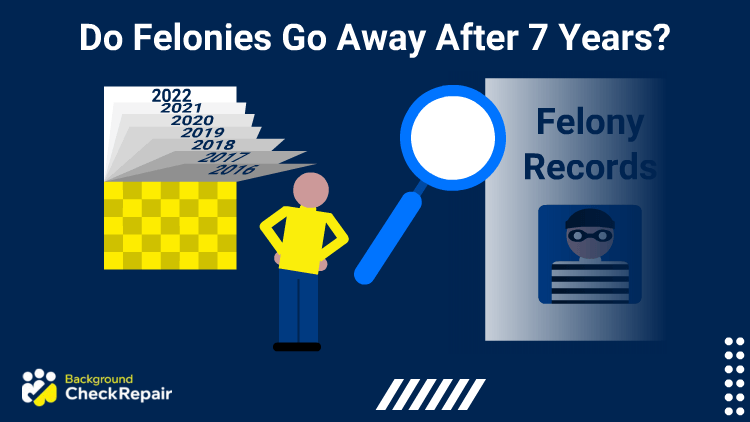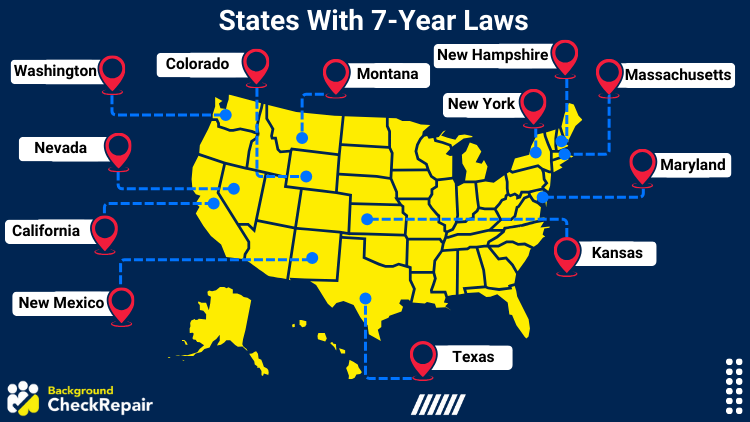
With background checks becoming more common and background check laws more confusing than ever, many people wonder, “Do felonies go away after 7 years?”
But, the answer is a little complicated because there are plenty of factors that dictate the length of time a felony can stay on the record.
In general, only certain states have passed laws that prevent background checks from showing felony records that are older than 7 years. However, that doesn’t mean that the felony can’t be accessed in these states.
There are 12 states that have passed laws dictating how far can background checks look at your history for employment (and what appears on a background check). These seven-year-background check states prevent felonies from showing up if they occurred before the last 7 years.
Yet, even in these states there are exceptions to the rule, so knowing the exact details of your state is extremely important.
What States Ensure Felonies Are Erased After 7 Years? (Criminal Background Check Laws by State)
Background check laws can be extremely complex and they vary widely from state to state. This is largely due to the fact that the only federal regulations regarding background checks are those outlined by the Fair Credit Reporting Act (FCRA).3 The FCRA acts as the federal laws regarding background checks such as who can perform them, what they can check for and what information is illegal to check for.
The main goal of the FCRA is to protect both businesses and their employees from unfair background check practices and other hiring practices that can become discriminatory. This mostly involves how credit reporting agencies share information as well as ensuring that individuals are giving written consent for background checks that involve an individual’s social security number or credit history information.

The FCRA is fairly limited in scope, leaving most of the major issues surrounding background check legality up to individual states and even cities and counties. When wondering do felonies go away after 7 years, the FCRA does not actually have any laws regarding how far back a background check can go.
This means that under federal law, a felony conviction from 30 years ago could hypothetically prevent someone from getting a job.
And…these records are always available to law enforcement personnel who are searching someone’s background in relation to criminal activity, so a felony technically never goes away.
In order to make it easier for individuals who have a criminal history to gain meaningful employment, many states have adopted laws to prevent someone’s criminal history from playing such a major role in their ability to find work. Although virtually every state has their own specific background check laws in addition to those outlined by the FCRA, only a handful of states have laws that prevent background checks from going back indefinitely.
These states are often referred to as 7-year-states because they limit the scope of background checks to only allow the reporting of criminal history information from the last 7 years, unless certain criteria are met that allows criminal history information from up to 10 years to be reported. The states that have 7-year-rules are as followed:
- California
- Colorado
- Kansas
- Massachusetts
- Maryland
- Montana
- Nevada
- New Hampshire
- New York
- New Mexico
- Texas
- Washington
Once again, although these are considered 7-year-states, there are special conditions that when met, allow for companies to perform background checks that cover up to 10 years of a person’s criminal history. Usually these exceptions involve certain jobs like law enforcement, or for jobs that make above a certain annual salary.
Keep in mind that the records still exist in 7-year states; but they are essentially sealed from the public and can only be accessed by Justice Department and law enforcement officials.
Does a Felony Go Away After 7 Years in My State?
There are only a handful of true 7-year-states, but as far as the question of “Do felonies go away after 7 years?” living in a 7-year-state is not the only way to make a felony go away.
Most states have laws that allow for the expungement or sealing of certain records if specific conditions are met. Many of these conditions involve the nature of the crime, how much time has elapsed and other details. Use the list below to learn about the possibility of getting records expunged in your state.
Keep in mind that only in 7-year-states do felonies go away automatically, in all other states individuals generally have to go through a legal process to petition for a record to be sealed or expunged.
How Long Felonies Stay on Record (Class Felonies Explained)
As mentioned, even in states that allow a felony to stay on your record forever, All but a few states have options for many felonies to be expunged. However, whether or not a felony can be expunged will depend on state law and the type of felony it was committed. Even if all other criteria are met to have a felony expunged, certain felonies will stay on your record forever.

It’s important to keep in mind that getting a felony record expunged or sealed is extremely difficult and in most cases, a felony will be on your record forever, unless the individual lives in a seven-year-state.
Do Felonies Go Away After 7 Years for Felony Classes?
Felony classes will vary by state, however most states have now adopted similar systems. In general, most states will use an alphabetical system, with Class A or its equivalent being the most serious felony, and E being the least serious.
Some states do not use a class felony system, instead each crime will have its own mandatory sentencing and punishments.
Although each state is slightly different, the table below can act as a general guide for what to expect from the different felony classes that are used in most states. Since each felony class distinction is up to the states, there is considerable overlap amongst crimes in various states. What might be considered a Class A in 1 state may be considered a Class B in another state, but could still carry the same punishment.
| Felony Class | Felony Definition | How Long Does the felony Stay on Your Record? |
| Class A/1 Felony | Crimes that carry the highest possible prison sentence such as life, death, or 30+ years. (First Degree Murder etc.) | Forever* (Usually no possibility of expungement) |
| Class B/2 Felony | Extremely serious crimes, usually punishable by up to 60 years in prison (Assault with a deadly weapon, sex crimes against vulnerable groups, gang related crimes, etc.) | Forever* (Usually no possibility of expungement) |
| Class C/3 Felony | Serious crimes, punishments range but usually at least 1 year in prison (assault, drug charges, theft, etc.) | Forever* (Extremely low possibility of expungement) |
| Class D/4 Felony | Serious crimes, punishments will vary but usually not more than 20 years. (Theft, Involuntary manslaughter, resisting arrest, DUI) | Forever* (Low possibility of expungement) |
| Class E/5 Felony | Serious crimes, punishments range but probation and short sentences possible. (Burglary, stalking, conspiracy to commit a serious crime) | Forever* (Expungement possible but very difficult and will depend on specific circumstances) |
*7-10 years in states that follow the 7-year-rule
Will Felonies Ever Go Away? (How Long Do Felonies Last?)
Many individuals who are wondering: Do felonies go away after 7 years? are likely worried that a felony on their record may cause them problems for the rest of their life.
Unfortunately, in most states felonies simply do not go away. Although there are ways to get felony records expunged or sealed, this is an extremely difficult and undependable avenue to depend on. In most states the expungement process for felony records requires extremely specific circumstances if there is a path to expungement available at all.
This means that individuals with a felony on their record will likely have to deal with the repercussions of it forever..

However, there are still steps that individuals can take to minimize the impact of a felony appearing on your record. The first is to seek expungement or the sealing of the record.
As mentioned, this is difficult and unlikely but is still a possibility worth exploring. Laws change constantly, especially for things like marijuana related convictions, which states such as Colorado1 are now making it possible to receive a full pardon for.
When it comes to employment issues caused by having a felony record, there are a few simple steps that individuals can take to increase their chance of landing a job. The first is to run a background check on yourself. This will not only allow individuals to be aware of what exactly is going to show up as part of a standard pre-employment background check but also allows the individual to fix anything that is incorrect.
Knowing what is on your criminal record will also allow individuals to prepare for any questions hiring managers may have about their record and allow them to explain the circumstances and how they are working to move forward from a criminal past.
Another thing to keep in mind is that there are more companies than ever that are making a point to give individuals with criminal records job opportunities. Doing some basic research on companies like Home Depot or Walmart and understanding their policy when it comes to hiring individuals with a felony record will prevent individuals from wasting time applying to companies that have strict policies regarding criminal convictions.
Undergoing a background check is stressful for just about everyone, but especially those with felonies on their record. Although new laws are making it easier for individuals with felonies to pass background checks, there are still a ton of different laws and regulations to understand. Being able to answer, do felonies go away after 7 years, will help immensely when determining your chances of passing a background check or getting a record sealed.
Frequently Asked Questions About Do Felonies Go Away After 7 Years





